 W
WMany scholars believe that advances in artificial intelligence will someday lead to a post-scarcity economy where intelligent machines can outperform humans in nearly every domain. The questions of what such a world might look like, and whether specific scenarios constitute utopias or dystopias, are the subject of lively debate.
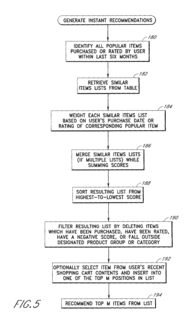 W
WAlgorithmic bias describes systematic and repeatable errors in a computer system that create unfair outcomes, such as privileging one arbitrary group of users over others. Bias can emerge from many factors, including but not limited to the design of the algorithm or the unintended or unanticipated use or decisions relating to the way data is coded, collected, selected or used to train the algorithm. For example, algorithmic bias has been observed in search engine results and social media platforms. This bias can have impacts ranging from inadvertent privacy violations to reinforcing social biases of race, gender, sexuality, and ethnicity. The study of algorithmic bias is most concerned with algorithms that reflect "systematic and unfair" discrimination. This bias has only recently been addressed in legal frameworks, such as the European Union's General Data Protection Regulation (2018) and Artificial Intelligence Act (2021).
 W
WThe Asilomar Conference on Beneficial AI was a conference organized by the Future of Life Institute, held January 5–8, 2017, at the Asilomar Conference Grounds in California. More than 100 thought leaders and researchers in economics, law, ethics, and philosophy met at the conference, to address and formulate principles of beneficial AI. Its outcome was the creation of a set of guidelines for AI research – the 23 Asilomar AI Principles.
 W
WIn the philosophy of mind, the China brain thought experiment considers what would happen if each member of the Chinese nation were asked to simulate the action of one neuron in the brain, using telephones or walkie-talkies to simulate the axons and dendrites that connect neurons. Would this arrangement have a mind or consciousness in the same way that brains do?
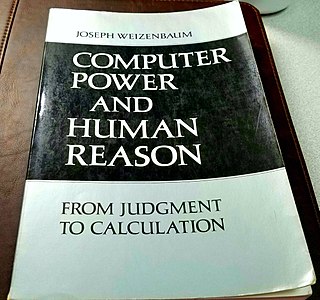 W
WComputer Power and Human Reason: From Judgment to Calculation (1976) by Joseph Weizenbaum displays the author's ambivalence towards computer technology and lays out the case that while artificial intelligence may be possible, we should never allow computers to make important decisions because computers will always lack human qualities such as compassion and wisdom. Weizenbaum makes the crucial distinction between deciding and choosing. Deciding is a computational activity, something that can ultimately be programmed. It is the capacity to choose that ultimately makes us human. Choice, however, is the product of judgment, not calculation. Comprehensive human judgment is able to include non-mathematical factors such as emotions. Judgment can compare apples and oranges, and can do so without quantifying each fruit type and then reductively quantifying each to factors necessary for mathematical comparison.
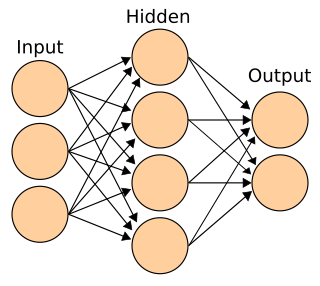 W
WConnectionism is an approach in the field of cognitive science that hopes to explain mental phenomena using artificial neural networks (ANN). Connectionism presents a cognitive theory based on simultaneously occurring, distributed signal activity via connections that can be represented numerically, where learning occurs by modifying connection strengths based on experience.
 W
WDataism is a term that has been used to describe the mindset or philosophy created by the emerging significance of big data. It was first used by David Brooks in The New York Times in 2013. More recently, the term has been expanded to describe what social scientist Yuval Noah Harari has called an emerging ideology or even a new form of religion, in which "information flow" is the "supreme value".
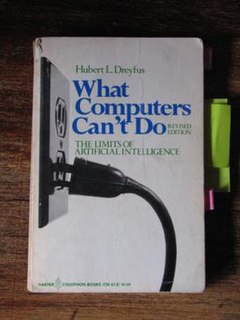 W
WHubert Dreyfus was a critic of artificial intelligence research. In a series of papers and books, including Alchemy and AI (1965), What Computers Can't Do and Mind over Machine (1986), he presented a pessimistic assessment of AI's progress and a critique of the philosophical foundations of the field. Dreyfus' objections are discussed in most introductions to the philosophy of artificial intelligence, including Russell & Norvig (2003), the standard AI textbook, and in Fearn (2007), a survey of contemporary philosophy.
 W
WHubert Lederer Dreyfus was an American philosopher and professor of philosophy at the University of California, Berkeley. His main interests included phenomenology, existentialism and the philosophy of both psychology and literature, as well as the philosophical implications of artificial intelligence. He was widely known for his exegesis of Martin Heidegger, which critics labeled "Dreydegger".
 W
WThe Emperor's New Mind: Concerning Computers, Minds and The Laws of Physics is a 1989 book by the mathematical physicist Sir Roger Penrose.
 W
WThe ethics of uncertain sentience refers to questions surrounding the treatment of and moral obligations towards individuals whose sentience—the capacity to subjectively sense and feel—and resulting ability to experience pain is uncertain; the topic has been particularly discussed within the field of animal ethics, with the precautionary principle frequently invoked in response.
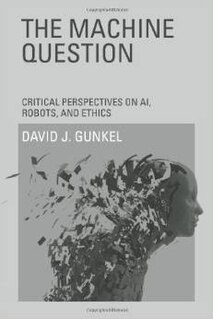 W
WThe Machine Question: Critical Perspectives on AI, Robots, and Ethics is a 2012 nonfiction book by David J. Gunkel that discusses the evolution of the theory of human ethical responsibilities toward non-human things and to what extent intelligent, autonomous machines can be considered to have legitimate moral responsibilities and what legitimate claims to moral consideration they can hold. The book was awarded as the 2012 Best Single Authored Book by the Communication Ethics Division of the National Communication Association.
 W
WThe Master Algorithm: How the Quest for the Ultimate Learning Machine Will Remake Our World is a book by Pedro Domingos released in 2015. Domingos wrote the book in order to generate interest from people outside the field.
 W
WThe Outer Limits is a Canadian-American television series that originally aired on Showtime, Syfy and in syndication between 1995 and 2002. The series is a revival of the original The Outer Limits series that aired from 1963–65.
 W
WSingularitarianism is a movement defined by the belief that a technological singularity—the creation of superintelligence—will likely happen in the medium future, and that deliberate action ought to be taken to ensure that the singularity benefits humans.
 W
WTranshumanism is a philosophical and intellectual movement which advocates for the enhancement of the human condition by developing and making widely available sophisticated technologies able to greatly enhance longevity, mood and cognitive abilities, and predicts the emergence of such technologies in the future.
 W
WThe Turing test, originally called the imitation game by Alan Turing in 1950, is a test of a machine's ability to exhibit intelligent behaviour equivalent to, or indistinguishable from, that of a human. Turing proposed that a human evaluator would judge natural language conversations between a human and a machine designed to generate human-like responses. The evaluator would be aware that one of the two partners in conversation is a machine, and all participants would be separated from one another. The conversation would be limited to a text-only channel such as a computer keyboard and screen so the result would not depend on the machine's ability to render words as speech. If the evaluator cannot reliably tell the machine from the human, the machine is said to have passed the test. The test results do not depend on the machine's ability to give correct answers to questions, only how closely its answers resemble those a human would give.
 W
WIn aesthetics, the uncanny valley is a hypothesized relation between an object's degree of resemblance to a human being and the emotional response to the object. The concept suggests that humanoid objects that imperfectly resemble actual human beings provoke uncanny or strangely familiar feelings of eeriness and revulsion in observers. "Valley" denotes a dip in the human observer's affinity for the replica, a relation that otherwise increases with the replica's human likeness.